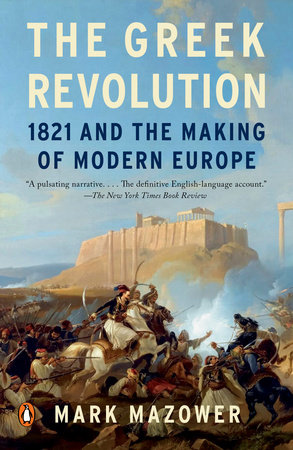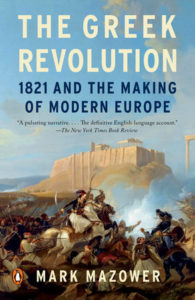

In 1987, a conference was held in Athens to mark the 150th anniversary of the foundation of the University of Athens in 1837, a few years after Greece had become a kingdom under the Bavarian king Otto von Wittelsbach. During the conference, some German historian argued that the establishment of a university in Greece at that time was premature and explained why, in their view, Greece was not ready to create such an institution. When it was his turn to come to the podium, Vasileios Sfyroeras commented, “As they say it in my village of Naxos, by the time a sane person thinks about crossing a river, the mad person has already done it.” He thus undermined the rationale behind the discussion: Greece was indeed not ready to have a university, until it had one. The same reasoning applies to the outbreak of the revolution that led to the emergence of the Greek state. Most Greek intellectuals, from the leading figure of the Greek Enlightenment, Adamantios Korais (who lived in Paris), to a man who would become prime minister, Alexandros Mavrokordatos (who lived in Pisa), were convinced that the time had not yet come for a revolution and that decades of preparation would be necessary for such a revolution to occur. They were, of course, right. However, a revolution did erupt and, “against the odds”— the phrase appears several times in Mark Mazower’s history of the Greek Revolution and its global repercussions—the tiny David wrested from Goliath a new independent state on the margins of Europe, legitimized on the basis of nationality.
The Greek Revolution: 1821 and the Making of Modern Europe is a beautifully written, enthralling book. Instead of belaboring certain points, Mazower chooses incidents and stories and organizes them in a way that allows them to do much of the work. His own comments, when they come, are brief and brilliant. One of the book’s many strengths is the fact that it focuses on all the groups involved in and affected by the uprising that began in early 1821, first in the principalities of Walachia and Moldavia (in today’s Romania) and then in the Peloponnese. The book is not only about “Greeks,” whatever that word meant in 1821. Indeed, Turks and Albanians feature as much as Greeks in the book, as do Egyptians once the Pasha of Egypt, Mehmet Ali, had sent his son Ibrahim, along with a sizeable (multi-ethnic) army and navy, to the heart of the rebellion upon the request of the Ottoman Sultan in 1825. The involvement of Albanians was especially significant for both sides of the conflict, as which highlighted by Mazower.
In the book, we also encounter fighters, opportunists, adventurers, ideologues, humanitarians, and mercenaries from dozens of different ethnicities or nations who flocked to Greece to play a role at various times during the 1820s. Mazower vividly shows the bewildering variety of motives among people on both sides of the conflict. Moreover, there were often more than two sides fighting, for example when the notorious Albanian Ali Pasha fought against the Ottoman Porte (his nominal overlords) or when different Greek factions fought civil wars while at war with the mighty Ottoman Empire. Mazower also highlights the class dimensions of these tensions, as well as the (at times decisive) ways in which the uprising itself and the related military exigencies affected class relations and interactions and created a different kind of politics (for a characteristic illustration of this analysis, see p. 75). The confounding shifts in the loyalties of numerous chieftains, their plundering or pirating activities, and their many double dealings are analyzed with even-handedness. Mazower also unveils the moments when an eventual transition to a national self-consciousness and self-identification emerged during the struggle, most notably through the character of Georgios Karaïskakis (363-365). His attribution of Karaïskakis’s ability to identify with the nation (rather than a clan or region) to his lack of sprawling family networks, which most other warlords possessed, is highly plausible.
Another commendable aspect of the book is the constant attempt to find out how women were affected by and reacted to the events described, despite the scarcity of sources about the topic. Given how many thousands of women and children were captured and sold at slave markets in Constantinople, Cairo, and elsewhere, the fate of these women, where it can be ascertained, is important and telling. Similarly, Mazower addresses the fate of many men who were sold to slavery and converted to Islam, eventually playing a major role in the Ottoman administrative or military hierarchy. In addition, Mazower follows the afterlives of most of the dramatis personae, accounting for their burial sites, the state of their graves today, the location and current condition of the houses in which they lived, or other relics that remain of their story. The author also describes in evocative details the ways in which the cities or islands at stake have changed today. My favorite description is in Mazower’s account of the capture of the fortress-island of Gramvousa (which he transliterates as Grabousa) on the northwestern edge of Crete. As he puts it, “On the very beach where a century and a half later the newlywed Princess Diana would wander in a yellow bikini while her husband sunbathed, the men disembarked early one morning” (299).
Mazower also illustrates the multiple and often unnoticed ways in which events and developments related to the Greek Revolution and responses to it in the rest of the world galvanized all sorts of important changes, the most important of which was the eventual emergence of the nation as the new principle of international legitimacy in Europe. The Greeks were the first group in Europe to assert independence on the grounds of nationality and to achieve it in the teeth of Metternich’s strict policing of the international order. Mazower’s book includes a fascinating analysis of the way in which both oppositional liberals and radicals, on the one hand, and Christian conservatives, on the other, converged in support of the Greeks in France from 1825 onward. The volume also describes the ways in which Philhellenism and anti-slavery movements interacted in the United States—as well as instances when they did not—and the legitimate complaints raised by African Americans and their defenders in the face of some double standards. In fact, the American politician and scholar Edward Everett directly connected Greek independence to the idea of the creation of a free state by African Americans in Liberia in a speech to the American Colonization Society in 1832, in which he stated that the time seemed “favorable to the movement; …in harmony with the great incidents of the time.” He added that “[f]rom the east of Europe to the north of Africa, surprising changes, favorable to civilization,” had been taking place.
Understandably, the book does not discuss all relevant incidents or people, such as Everett, who was crucial in galvanizing American Philhellenism in the early 1820s, or David Urquhart, who was instrumental in the story of the Greek Revolution. However, overall Mazower’s choices are indeed felicitous. He chose well in highlighting the idealistic fervor with which men such as Franz (later Francis) Lieber went to fight for the Greeks and the exasperated disappointment of those same men shortly after. Mazower makes another excellent choice when he shares the story of Samuel Gridley Howe, the consistently humane and resilient American medical doctor who joined the Greeks and kept on helping, despite all the odds and disappointments, doing more than most people for the displaced and orphaned. Howe’s memoirs, detailed and disarmingly honest, were published by his daughter and have been an invaluable source for historians. That Howe went on to dedicate his efforts to the cause of the Poles immediately afterward is another typical example of such itinerant liberational zeal.
Another major feat of the book is its emphasis on how developments in capitalism acted on and were influenced by events unfolding in Greece. It is one of Mazower’s strengths that he is, among other things, an economic historian with distinguished works to his record. The chapter entitled “English Gold” describes the baffling complexities of the loans that the Greeks acquired from London with the—not purely idealistic—help of the chairman of the London Greek Committee, John Bowring (equally known for his infamous later exploits as Governor of Canton and for flattering Jeremy Bentham enough to become his literary executor). The book also brilliantly provides a clear and accessible explanation of the financial context in which such loans were made possible.
The book is well edited, and each time a character we have encountered earlier in the volume re-appears, enough (but not more) is said to remind the reader of who he or she is. There are remarkably few typographical errors (one instance is that “Gustav d’Eichthal” [453] ought to read “Gustave d’Eichthal”). The only issue to raise, for the little that it is worth, is in the transliteration and spelling of Greek names (a nightmare for every author, as Mazower admits in the preface). There are indeed some inconsistencies in transliteration across the anglicized versions and the faithfully transcribed Greek names (for example, the book mentions Odysseus Androutsos, Konstantine Kanaris, Alexandros Ypsilantis, but Alexander Kantakuzinos; likewise, Georgios Karaïskakis, Giorgios Karaïskakis, and George Koundouriotis appear, but also Giorgios Koundouriotis). However, these are trifles, which probably nobody else except this pedantic reviewer will notice.
Mazower is balanced and unbiased in describing the failings and cruelty displayed by all sides in the conflict. He demythologizes the vast majority of the “heroes” who were later canonized by Greek nationalist historiography and textbooks. His comprehensive coverage of all aspects, incidents, and ethnic and social groups involved is an achievement in itself. Mazower does an exemplary job of combining a beautiful narrative with a critical analysis of the most sophisticated works of recent scholarship. This book will be seen as the best history of the Greek Revolution for a long time to come, and most deservedly so.
Georgios Varouxakis is Professor of the History of Political Thought at Queen Mary University of London (School of History) and the co-director of the Centre for the Study of the History of Political Thought. His books include Liberty Abroad: J.S. Mill on International Relations (Cambridge University Press, “Ideas in Context” series, 2013), Victorian Political Thought on France and the French (Palgrave Macmillan, 2002), Mill on Nationality (Routledge, 2002), and Contemporary France: An Introduction to French Politics and Society (Arnold, 2003, co-authored with David Howarth). He is currently completing the monograph Occident: The History of the Idea of the West, to be published by Princeton University Press.
The Greek Revolution: 1821 and the Making of Modern Europe
By Mark Mazower
Publisher: Penguin Press
Hardcover / xxxiv + 574 pp. / 2021
ISBN: 978-0-241-00410-4
Published on February 14, 2023




